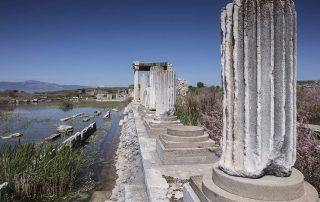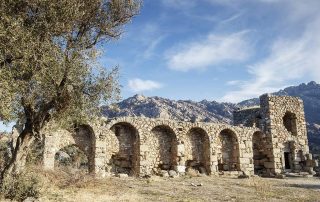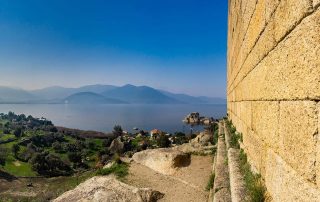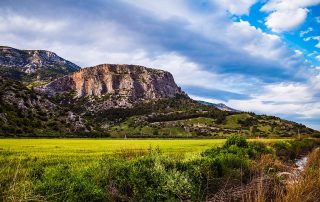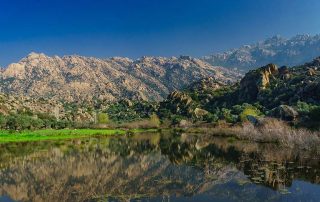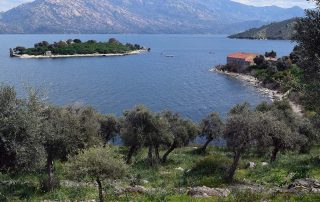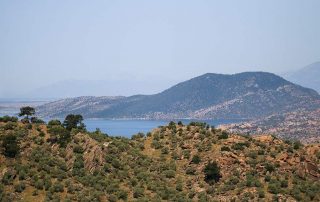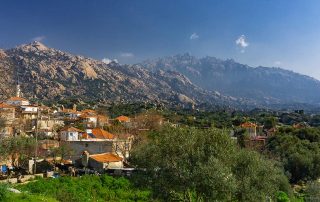Miletus
From the Mount of Olives Miletus looks northwest to the ruins of one of the most important cities in the world for mankind, Miletus. It was in this city that the natural sciences were born. Miletus is the birthplace of (Western) philosophy.
Miletus and Milesians were prosperous with over 80 colonies of their own on the Middle and Black Seas. Miletus was a melting pot, multicultural, maritime, cosmopolitan and curious. These were probably the causes that here, not elsewhere, free thinking could develop in such a way. Thales, Anaximander and Anaximenes, who lived in the 6th century BC, are the most famous Milesians. They are called pre-Socratics and natural philosophers, respectively. The Turks say “it must be because of the air and water of this area”. There is really some truth in this; in this area the descendants of Thales and Anaximander still like to philosophize. Here, almost everyone is a philosopher, explaining the universe and the meaning of life to you at every opportunity… That’s why we call our olive oil THE PHILOSOPHER’S GOLD.
Milet’s origins date back to the Neolithic period around 9500 BC, the first city “Milet I” probably dates back to the Copper Age (late 4th millennium BC). The founding mothers and fathers of Miletus were Hittites who called the city “Millawanda”.
Miletus was located on a tongue of sea. In its heyday, over 100,000 people lived here. After its destruction by the Persians in 494 BC, the city was rebuilt with four harbors according to the Hippodamian scheme. That is why Miletus is called “Manhattan of the ancient world”. However, for the comparison with Manhattan it lacks water. This is because the river Meander (Turkish: Büyük Menderes), caused the entire gulf to silt up due to the large amounts of sediment it carried with it, so that today the port city of Miletus lies about 8 km inland.
Mount of Olives Miletus
Our olive grove, located on the southwestern edge of the Menderes (Meandros) plain, is 5 hectares in size and a small mountain, so we affectionately call it our Mount of Olives. From the Mount of Olives, only 3 km to the north, you can see the Theater of Miletus (Miletos). Because of this extraordinary neighborhood and because olive oil has always been pressed in Miletus, our Mount of Olives brand is called Miletus.
When we took over our Mount of Olives in 2018, there were about 1,500 olive trees of various ages. Then, in the fall of 2019, we planted another 1,100 young saplings (variety: Memecik), which will take about 5 – 7 years to harvest from them for the first time.
Environmental protection & sustainability
Sustainable and ecological management of our oil mountain is enormously important to us. Only in this way can we also be sure that the oil we produce is of the best quality. We also want to preserve the diversity of wild herbs, flowers, insects, etc. on our oil mountain and thus maintain its ecological balance. This means that we do not use poison against pests (e.g. the olive fly), but rely on gentle methods (e.g. fly traps). We also completely avoid artificial fertilizers and herbicides.
In spring we sow so-called green manure. This is a balanced mixture of various plant seeds. Among them are many meadow flowers and herbs, which bring important nutrients into the soil, improve the living conditions of useful soil organisms, prevent soil erosion and, by the way, make the mountain bloom beautifully. Useful insects, such as bees and ladybugs find plenty of food. Later, the herbs are partially incorporated into the soil around the olive trees, providing a good nutrient base. We also get sheep or goat manure from the surrounding cattle farmers, which we spread very sparingly as natural fertilizer under our trees. Small flocks of sheep graze within sight of our Mount of Olives on the lush meadows on the edge of the Meandros plain.
We irrigate our young trees during the dry months so that they thrive and become hardy. We use water from our own well and direct it to each plantlet, where it is returned to the soil drop by drop.
Very important to us is a gentle harvest in early autumn. Even though it takes a lot of time, we harvest by hand. We pick our olives from the tree, sparing its branches and twigs.
In order to avoid monoculture and to increase the biodiversity on the mountain, many fruit trees, such as apples, pears, figs, almonds, have been planted next to the olive trees. These attract bees with their flowers in the spring, which also help pollinate the olive blossoms.
Currently we are in the 4th year of the organic certification process of CERES . We are audited annually and after a successful audit we always receive our organic certification for a limited period of 1 year, currently until October 30, 2022. After that we will get our permanent certification which will then be audited at longer intervals.
We are very proud that we can make our contribution to climate protection with the Mount of Olives Miletus.
Tour: Fantastic landscapes around Mount of Olives Miletus


